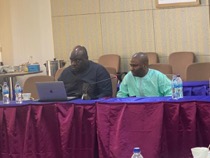
[ad_1]

He made this statement in the National Assembly on Monday, August 26, 2024, in response to allegations of tax evasion and bribery, which are currently being investigated by the Joint Committee of the Public Enterprises Commission (PEC) and the Finance and Public Accounts Committee (FPAC), where he cleared the air before the committee.
Responding to a question on the mechanism for traders to place their products, PS Jobe said: “From what I understand, this warehouse is a bonded warehouse so traders can place their products. Also, the positive aspect of this could be that you can have products all year round especially because you have an Oil Marketing Company (OMC) which cannot import. So, you can have products there but you can only get them if you pay for them.
“So no international traders are coming to the warehouses to drop off products; they need someone to buy them and they cannot afford to keep the products sitting somewhere waiting for a customer or an OMC to buy them. This is not true.”
Mr Jobe explained that if there was no request from the OMC for the product, no trader would come to the warehouse with their own product or use ships to transport thousands of tonnes of product to unload.
He mentioned that a request must be made to the warehouse, which must ask for an import plan and share it with the authorities to determine the number of tonnes that need to be imported each year.
He added that this was done to ensure that the country does not run out of products at any time.
However, it was suggested to PS Jobe that it was not the OMCs that negotiated with the international traders but the warehouses, which changed on October 28, 2023.
When asked what role the Ministry of Finance played in the formulation of the policy, another deputy finance minister, Abduli Jallow, responded that there was no Ministry of Petroleum at the time, so later when it came to fuel issues, it was seen as a fiscal issue and the Ministry of Finance “took the lead role in fuel management, pricing and so on”.
“It was only recently, I think in 2021 or 2022 if I remember correctly, that we handed over the fuel issue to the Ministry of Petroleum,” he explained. “But the Ministry of Finance was unilaterally doing the pricing in terms of fuel products. Here too, the Ministry of Finance was a very important part of the steering committee. It not only extends to them; the Ministry of Trade, the Ministry of Petroleum, the Bureau of Standards was also part of it, the Gambia Revenue Authority was also part of the committee. So once it was handed over to the Ministry of Petroleum, all these institutions were already in place.”
The joint committee at the end of the meeting asked for documents to further study the policies and transactions in fuel trading in the country.
[ad_2]
Source link

